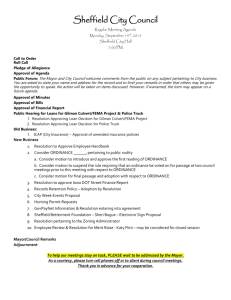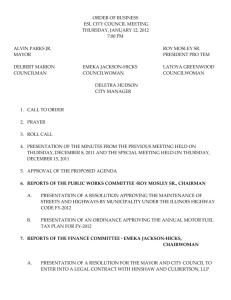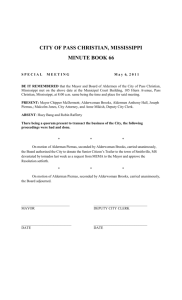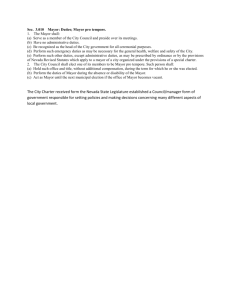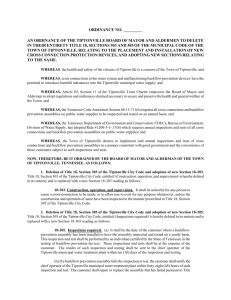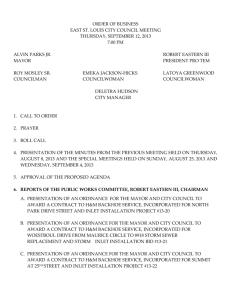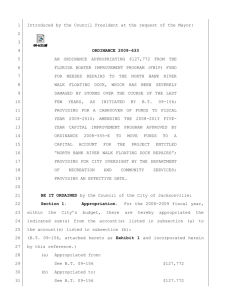Model Private Act Charter for Mayor-Aldermanic with
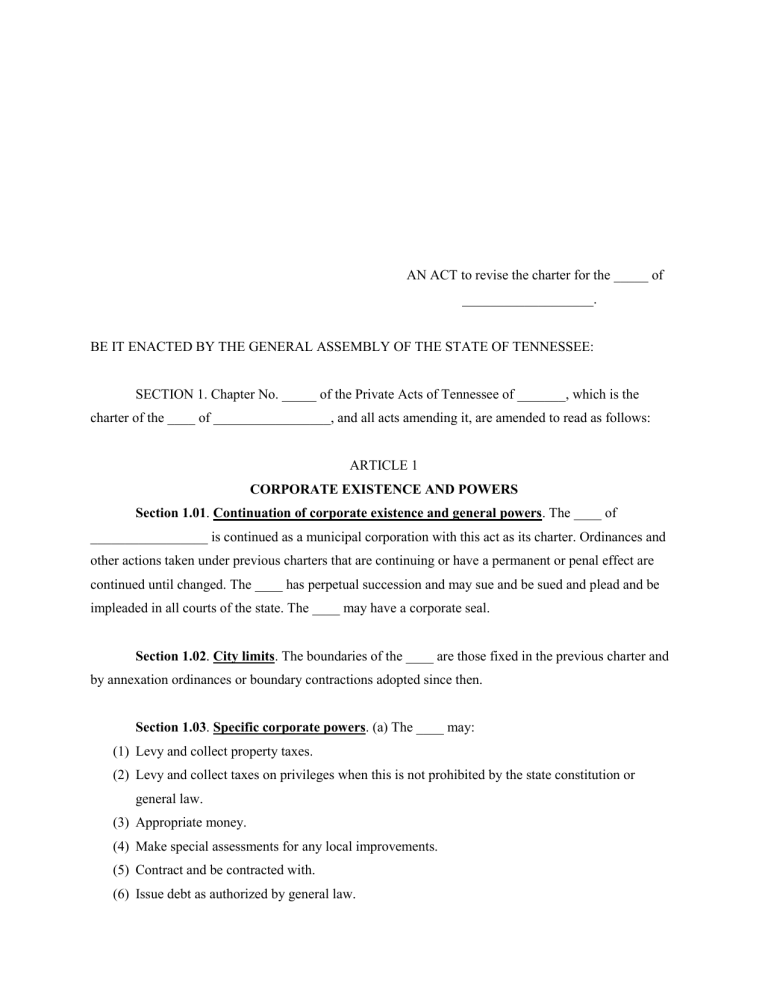
AN ACT to revise the charter for the _____ of
___________________.
BE IT ENACTED BY THE GENERAL ASSEMBLY OF THE STATE OF TENNESSEE:
SECTION 1. Chapter No. _____ of the Private Acts of Tennessee of _______, which is the charter of the ____ of _________________, and all acts amending it, are amended to read as follows:
ARTICLE 1
Section 1.01
.
CORPORATE EXISTENCE AND POWERS
Continuation of corporate existence and general powers . The ____ of
_________________ is continued as a municipal corporation with this act as its charter. Ordinances and other actions taken under previous charters that are continuing or have a permanent or penal effect are continued until changed. The ____ has perpetual succession and may sue and be sued and plead and be impleaded in all courts of the state. The ____ may have a corporate seal.
Section 1.02
. City limits . The boundaries of the ____ are those fixed in the previous charter and by annexation ordinances or boundary contractions adopted since then.
Section 1.03
. Specific corporate powers . (a) The ____ may:
(1) Levy and collect property taxes.
(2) Levy and collect taxes on privileges when this is not prohibited by the state constitution or general law.
(3) Appropriate money.
(4) Make special assessments for any local improvements.
(5) Contract and be contracted with.
(6) Issue debt as authorized by general law.
(7) Expend money for lawful purposes.
(8) Acquire, hold, maintain, improve, sell, lease, mortgage, pledge, and otherwise dispose of real or personal property, including any estate or interest, within or outside the ____ or state.
(9) Condemn any interest or estate in real or personal property, within or outside the ____ , for present or future public use.
(10) Hold property located in or outside the ____ in trust and administer trusts for the public benefit.
(11) Acquire, own, sell, lease, mortgage, pledge, or otherwise dispose of any public utility or any
estate or interest in any public utility that is or will be of service to all or part of the ____.
(12) Own, operate, and maintain any public utility or any estate or interest in any public utility that is
or will be of service to all or part of the ____.
(13) Grant franchises for the provision of public utilities and public services. A franchise may be
granted for a term up to twenty-five (25) years. The power to grant franchises embraces the right
to grant exclusive franchises. When an exclusive franchise is granted, it shall be exclusive
against all other entities, including the ____. The _______________________________ may
prescribe, unless prevented by law, the rates, fares, charges, and regulations that may be made by
the franchisee. Franchises may by their terms apply to territory within the____ on the date the
franchise is executed and to territory later annexed or added, and to existing
and later opened streets, alleys, and public ways.
(14) Make contracts for the provision of public utilities and public services. These contracts may have a
term up to twenty-five (25) years. The power to make these contracts embraces the power to make
exclusive contracts. When an exclusive contract is made, it shall be exclusive against all other
entities, including the ____. The __________________________________ may prescribe, unless
prevented by law, the rates, fares, charges, and regulations that may be made by the contractor.
These contracts may by their terms apply to territory within the ____ on the date the contract is
executed and to territory later annexed or added, and to existing and later opened streets, alleys,
and public ways.
(15) Prescribe reasonable regulations regarding the construction, maintenance, equipment, operation,
and service of public utilities; compel reasonable extensions of facilities for these services; and
assess fees for the use of or impact upon these services.
(16) Do any lawful thing necessary to provide and maintain safe, adequate, and clean streets,
sidewalks, alleys, parks, libraries, schools, fire stations, police stations, public marketplaces,
wharves, bridges, viaducts, subways, tunnels, sewers, drains, and other public facilities within or
outside the ____ , regulate their use, and assess fees for the use of or impact on these facilities.
(17) Collect and dispose of drainage, sewage, ashes, garbage, refuse, or other waste, or license and
regulate their collection and disposal. The cost of collection, regulation, and disposal may be
funded by taxation, special assessments, user fees, impact fees, or other charges.
(18) License and regulate businesses, trades, professions, and occupations not prohibited by law and
impose license fees and taxes on them.
(19) Regulate or prohibit and abate any conduct or use of property that is inimical to the public health,
safety, or welfare, and exercise general police powers.
(20) Enact zoning regulations.
(21) Provide and maintain charitable, educational, recreative, curative, or detentive institutions,
departments, and services.
(22) Enforce any ordinance by fine, forfeiture, and penalty, and by other action in any court of
competent jurisdiction.
(23) Establish an educational system.
(24) Regulate, tax, license, and suppress the keeping or going at large of animals, provide an animal
shelter, impound animals, and , in default of redemption, sell, give away, or dispose of them.
(25) Call elections as provided in this charter.
(26) Provide insurance to officers and employees.
(27) Exercise any power this charter could enumerate as fully and completely as if those powers were
specifically enumerated.
(b) In carrying out the powers granted in this charter, the board shall use an ordinance for any matter of a permanent or penal nature but may use a resolution for any administrative, temporary, or other matter.
ARTICLE 2
BOARD OF MAYOR AND ALDERMEN
Section 2.01
. Elections . The serving mayor and aldermen shall continue to serve until the next regular November general state election that occurs on or after the expiration of their terms. At this election these posts will be filled for a term of four (4) years. Subsequent elections will be held with the general November state election. Elections of aldermen will be at-large until changed by ordinance. The mayor shall be elected at large and the person receiving the largest number of votes shall be declared elected. The number of aldermanic candidates receiving the highest number of votes corresponding to the number of aldermanic positions to be filled will be declared elected. Persons elected will be sworn in at the beginning of the next scheduled meeting of the board. The board may by ordinance change the date of elections.
Section 2.02
. Composition . The present composition of the board, consisting of the mayor and
__ aldermen, is continued. The number of aldermen may be changed by ordinance, to be effective with any subsequent election, but may not be fewer than two (2) nor more than eight (8).
Section 2.03
. Residence requirements . (a) A person must have resided in the ____ for at least one (1) year immediately preceding the date of the election to qualify to run for mayor or alderman.
Residence in an annexed area counts in meeting this residency requirement. If members of the board are elected from districts, a person must reside in the district to qualify for election and to serve.
(b) The mayor or any alderman moving outside the ____ during the term of office, or outside a district if elections for aldermen are from districts, automatically vacates the office, which shall be filled as provided in this charter.
Section 2.04
. Districts authorized . The board may by ordinance provide for the election of aldermen by district. If the board provides for elections by district, it shall by ordinance create contiguous single-member districts equal to the number of aldermen. The districts must be equitably apportioned according to population. The establishment of districts and the fixing of their boundaries must be accomplished at least twelve (12) months before the next regular city election at which aldermen are to be elected by district, and any change in district boundaries must also be accomplished within this time limitation. The board must reapportion the districts once in each ten (10) years. One (1) alderman shall be elected from each district. The ordinance establishing districts or an amendment to the ordinance may provide that each district alderman will be chosen by an at-large vote or only by the voters of the district.
The ordinance providing that aldermen be chosen by district may include any reasonable transition provisions necessary to provide either for staggered or nonstaggered terms for aldermen.
Section 2.05
. Duties of the mayor . (a) The mayor:
(1) Shall preside at meetings of the board.
(2) Shall communicate any information and recommend measures to the board the mayor deems expedient.
(3) Shall make temporary appointments of the city administrator, recorder, treasurer, city attorney, city judge, and department heads when these persons are absent, sick, or disabled, and report the appointment to the board at its next regular meeting. The board may confirm or reject the mayor’s temporary appointments, and when it rejects an appointment, make its own. The board shall make appointments to fill vacancies in office.
(4) May call special meetings of the board. The mayor shall state the matter or matters to be considered at the special meeting, and the action of the board is limited to the stated matter or matters.
(5) Shall countersign checks and drafts and sign all contracts to which the ____ is a party.
(6) May make motions and vote on all matters coming before the board.
(7) Shall make appointments to boards and commissions as authorized by state statute or ordinance.
(b) Unless otherwise designated by the board by ordinance, the mayor shall perform the following duties or may designate a department head or department heads to perform any of the following duties:
(1) The duties of city administrator if the board does not appoint an administrator, or if someone else is not designated by the board to perform those duties.
(2) Hire, promote, discipline, suspend, and discharge all employees except as otherwise provided in this charter.
(3) Act as purchasing agent.
(4) Prepare and submit the annual budget and capital program to the board.
(5) Other duties that are required by the board.
Section 2.06
. Vice mayor . The board shall elect an alderman as vice mayor, who shall serve as mayor when the mayor is absent. When there is a vacancy in the office of mayor, the vice mayor shall serve as mayor until the next regular municipal election.
Section 2.07
. Vacancies . (a) The board shall fill a vacancy in the office of alderman for the unexpired term by an affirmative vote of a majority of the remaining aldermen, but any portion of the unexpired term extending beyond the next municipal election shall be filled by the voters at that election if the vacancy occurs at least twenty (20) days before the latest time for filing nominating petitions for candidates in that election.
(b) Elections by the board to fill vacancies shall be by voice vote on the calling of the roll. If a tie vote occurs, the presiding officer shall vote a second time to break the tie.
Section 2.08
. Compensation . The compensation of all officers shall be established in the ordinance adopting the annual budget and capital program. The mayor’s compensation may not be diminished during the mayor’s term of office.
ARTICLE 3
ORDINANCES AND RESOLUTIONS
Section 3.01
. Procedure . An ordinance must be considered and passed on two (2) separate days to be effective. A resolution or any other form of board action may be considered and adopted in one
(1) day. Any form of board action, to be effective, must be passed by a majority of the members present if there is a quorum. A quorum is a majority of the authorized membership of the board. The recorder or the recorder’s designee shall record all votes on all forms of board action.
Section 3.02
. Publication of penal ordinances . Each ordinance of a penal nature, or its caption, shall be published after its final passage in a newspaper of general circulation in the ____. No such ordinance may take effect until the ordinance or its caption is published.
ARTICLE 4
OFFICERS AND DEPARTMENT HEADS
Section 4.01
. City administrator . (a) The board may appoint a city administrator. The city administrator shall report and be responsible to the board, but the board may delegate this supervisory authority to the mayor.
(b) The board may by ordinance require the city administrator to perform any of the following duties:
(1) Administer the business of the ____.
(2) Make recommendations to the board for improving the quality and quantity of public services provided by the ____.
(3) Keep the board fully advised on the conditions and needs of the ____.
(4) Report to the board the condition of all property, real and personal, owned or controlled by the
____ and recommend repairs or replacements as needed.
(5) Recommend to the board and suggest the priority of programs or projects involving public works or public improvements that should be undertaken by the ____.
(6) Recommend specific personnel positions and propose personnel policies and procedures for approval by the board.
(7) Other duties required by the board.
Section 4.02
City recorder . (a) The board shall appoint a city recorder, who also may be appointed to the positions of director of finance or treasurer, or both.
(b) The recorder or the recorder’s designee must be present at all meetings of the board and keep a full and accurate record of all business transacted by the board to be preserved permanently.
(c) The recorder or the recorder’s designee shall have custody of the city seal, public records, original rolls of ordinances, ordinance books, minutes of the board, contracts, bonds, title deeds, certificates, official papers, all official indemnity or security bonds, oaths and affirmations and all other official records and papers and documents and preserve them in the recorder’s office or in another storage place designated by the board. The recorder or the recorder’s designee shall register
these documents by numbers, dates, and contents and keep an accurate and modern index of these materials. These public records and materials are the property of the ____.
(d) The recorder shall provide, copy, and, when required by any officer or person, certify copies of records, papers, and documents in the recorder’s custody. Fees for copying and certification shall be charged as established by ordinance or resolution.
Section 4.03
. City court and city judge . (a) A city court is created to be presided over by a city judge. The board shall appoint the city judge. The city judge must meet the qualifications established by the board by ordinance.
(b) In the absence or disability of the city judge, the mayor may appoint a qualified person to serve as city judge until the next meeting of the board, at which the mayor’s appointment may be approved or at which the board may appoint another qualified person to serve until the city judge returns.
(c) The city judge may impose fines for ordinance violations and may also impose costs and forfeitures. The judge may preserve and enforce order in the court and enforce the collection of all fines, costs, and forfeitures imposed.
(d) Fines and costs may be paid by installment in a manner provided by ordinance. The city judge may forgive, with or without condition, fines and costs imposed for an ordinance violation. The city judge shall make a monthly report to the board of all fines, costs, and litigation taxes collected, and transmit these revenues to the municipal treasury.
Section 4.03
. City attorney . The board shall appoint a city attorney, who must be licensed to practice law in the state. The city attorney shall attend meetings of the board and provide legal advice on municipal matters to the board and other officers. The city attorney shall perform other duties required by the board.
Section 4 .
04 . Treasurer . The board shall appoint a treasurer and may appoint the recorder as treasurer. The treasurer shall collect, receive, and issue receipts for taxes and all other revenue and monies coming into the ____’s possession, and disburse them.
Section 4.05. Director of finance . The board shall appoint a director of finance and may appoint the recorder or the city administrator as director of finance. The director of finance shall:
(1) Exercise general supervision over the fiscal affairs of the ____.
(2) Exercise general accounting supervision over all assets, property, and claims.
(3) Act as general accountant and auditor of the ____.
(4) Cause an efficient system of accounting to be installed and maintained.
(5) Require proper fiscal accounts, records, settlements, and reports to be made, kept, and rendered by the departments of the ____ .
(6) Provide monthly financial reports to the board.
(7) Prescribe and regulate the manner of paying creditors, officers, and employees of the ____.
(8) Perform other duties assigned by the board.
SECTION 2. This act has no effect unless it is approved by a two-thirds (2/3) vote of the authorized membership of the ________________________________________ of the ____ of
__________________________. Its approval or non-approval shall be proclaimed by the Mayor and certified to the Secretary of State.
SECTION 3. For purposes of approving or not approving of this act, it shall take effect upon becoming a law, the public welfare requiring it. For all other purposes, it takes effect upon being approved as provided in Section 2.
